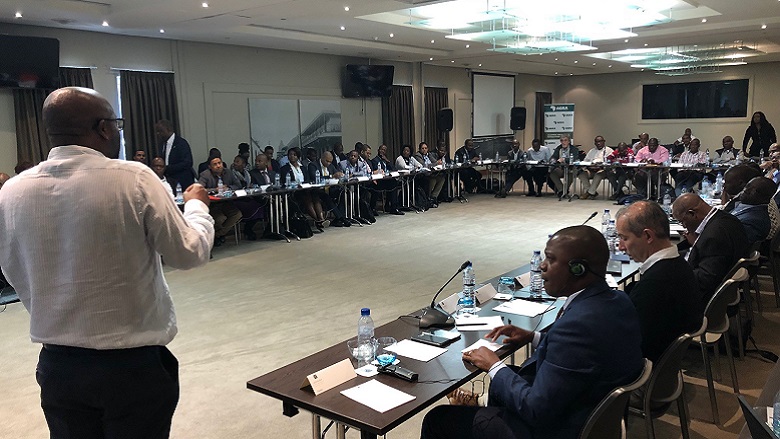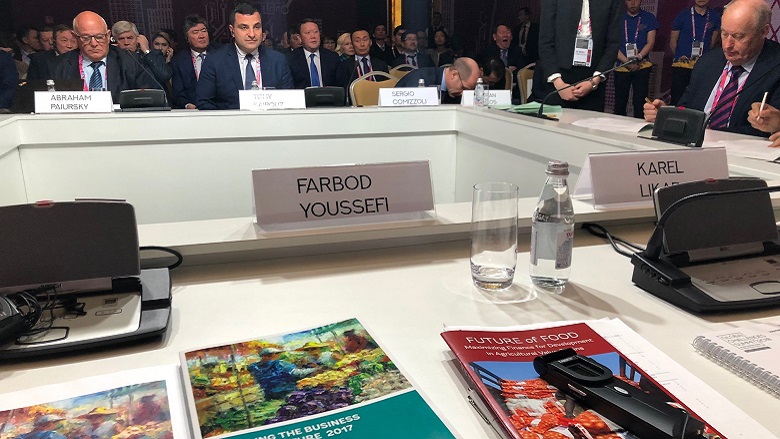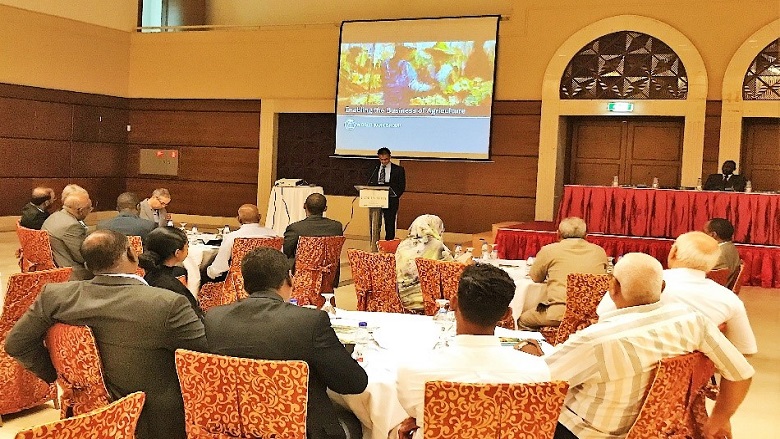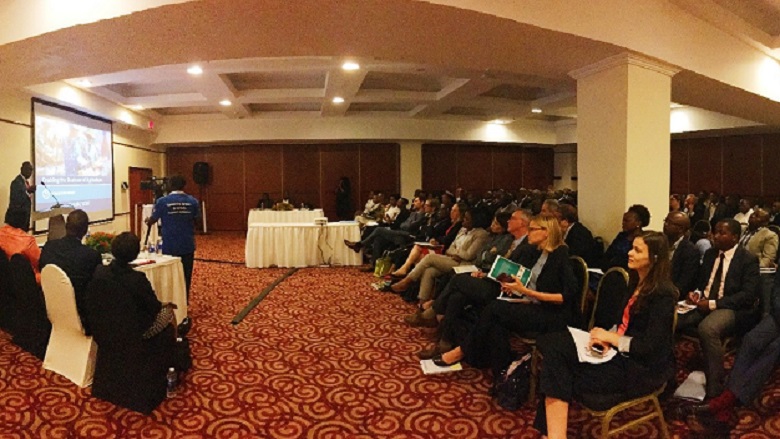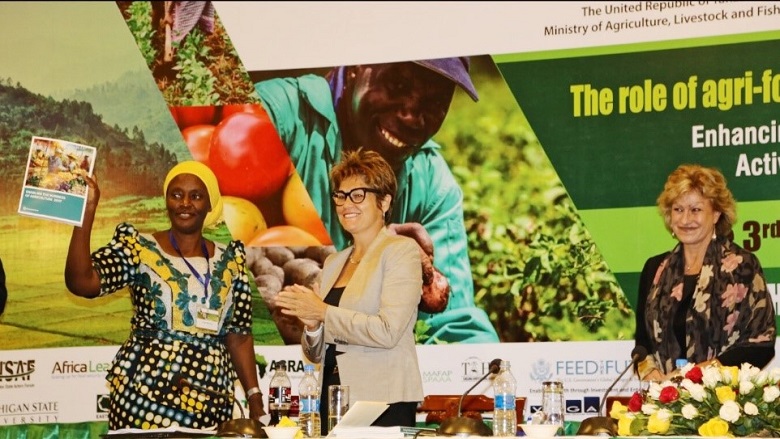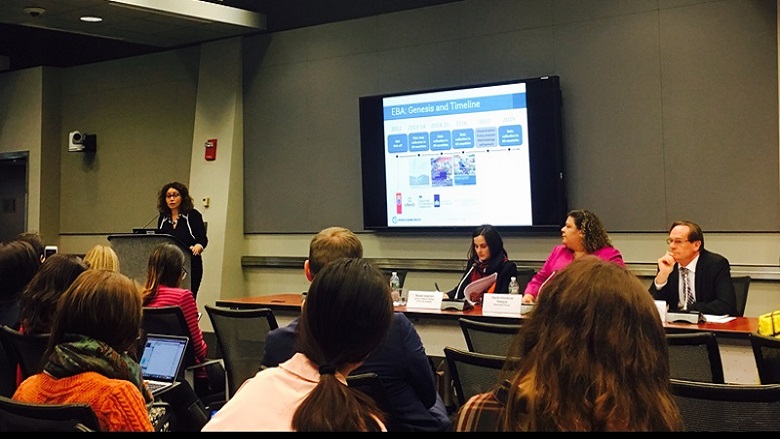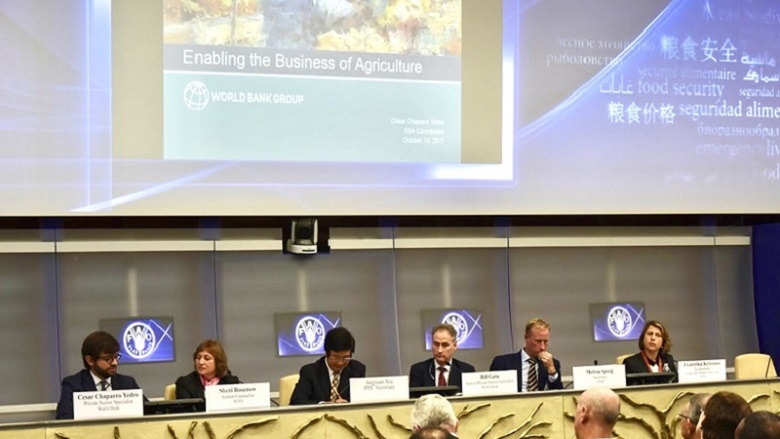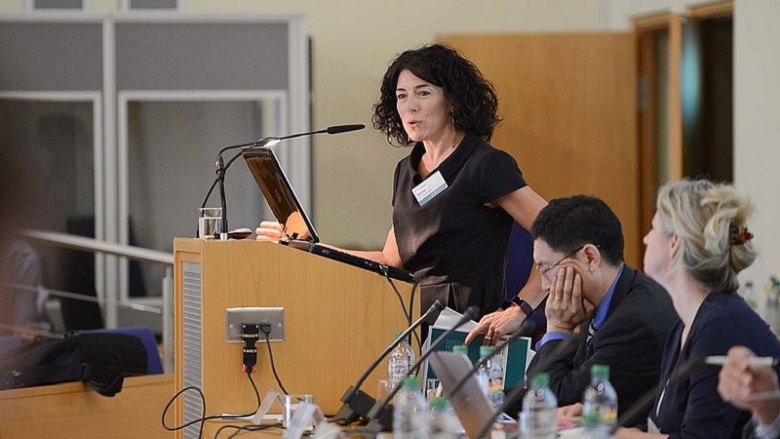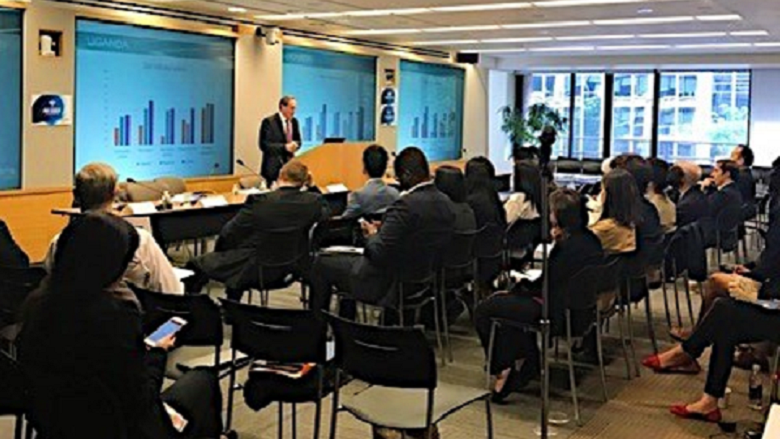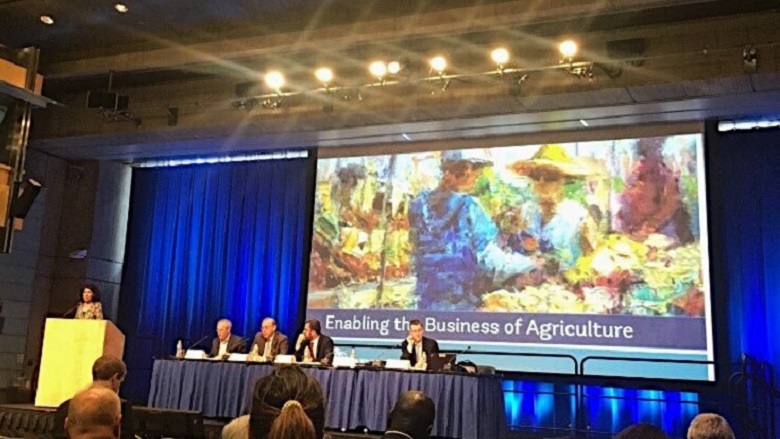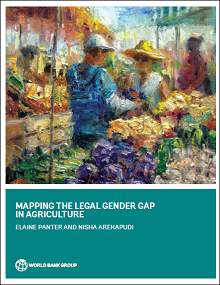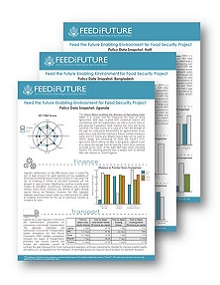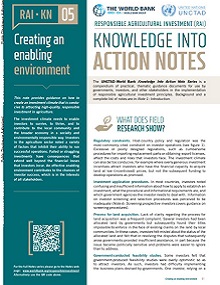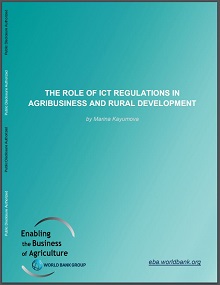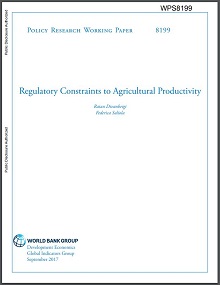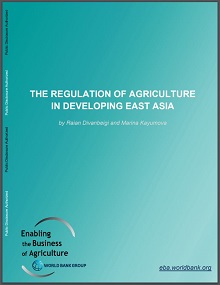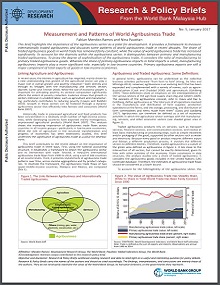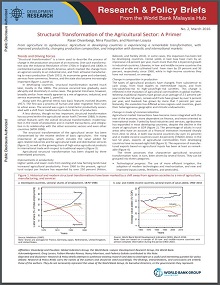Engagement with Lao PDR
April 2019
EBA 2017 Report results were presented, in April 2019, at the Government’s Agriculture Sector Working Group meeting, chaired by Vice Minister Dr. Phouang Parisak Pravongviengkham. Given the Prime Minister’s call to strengthen the business environment in Lao PDR, a Government board has been formed to drive this agenda, providing an opportunity to integrate into its analyses and approach the findings of EBA. Follow up meetings were held with the Departments of the Ministry of Planning and Investment and of the Ministry of Agriculture, to discuss how EBA results can be used to support the Ministry’s work on the country’s business climate. Joint actions are being planned to analyze and localize EBA findings in order to identify priority regulatory areas to be strengthened for private sector investment.
Engagement with Cambodia
April 2019
In Cambodia, the project team has been engaging with officials from the Ministry of Agriculture, Forestry and Fisheries (MAFF), and the Technical Working Group on Agriculture and Water (TWGAW) to discuss regulatory weaknesses underpinning the agribusiness enabling environment. In a March 2019 engagement with the Working Group, co-chaired by MAFF’s Secretary of State Dr. Hean Vanhan, EBA 2017 Report results were presented to close to 100 participants from across relevant government ministries, policy and research institutions, development partners, private sector and NGOs. The Working Group, which is a cross-Ministry entity that focuses on agriculture, has been designated by the country’ Secretary of State for Agriculture as a government technical working committee to develop a work plan around EBA findings. The Ministry of Agriculture also aims to incorporate into its Agriculture Sector Strategic Development Plan (ASDP) and Agriculture Sector Master Plan (ASMP), which delineates the country’s strategy for agriculture until 2030, input based on EBA. Further meetings held with private sector players in the agribusiness sector (agricultural marketing firms, financial institutions and input suppliers) provided further information on regulatory constraints to be examined in upcoming activity around the EBA report.
Engagement with Zimbabwe
February 26-28, 2019
Following up on the launch of the EBA 2017 report in Zimbabwe in May 2017, EBA findings have been included as one of the components of the technical assistance that has been provided by the Bank to the Government of Zimbabwe. As part of this activity, a three-day Agriculture Sector Vision Development workshop was jointly organized by the Ministry of Agriculture and the World Bank in February which launched the development of a vision for the Agriculture sector for Zimbabwe. A wide range of stakeholders actively participated in the event, including senior policy makers, private companies, development agencies, research institutes, academia and civil society organizations. During the workshop, participants deliberated on some of the EBA17 findings in assessing options for Zimbabwe’s agriculture sector and are preparing to present their assessment at the Investors Forum to be held in Harare in August 2019.
Engagement with Mozambique
February 2019
Following up on a country-level workshop carried out jointly with AGRA (Alliance for a Green Revolution in Africa) in June 2018, in which policy options were formulated based on the project's data to develop a national reform program, eight months later project findings were presented to Minister of Agriculture Higino de Marrule and his team. Recent improvements in the enabling environment were discussed, and attention was given to prominent gaps and weaknesses within the agribusiness regulatory framework impacting private investment in the sector. It was agreed that issues raised by the project's data and other relevant enabling environment issues would be included in the processes set in motion to inform the development of a national agricultural strategy for 2020-2030.
Engagement with Kenya
February 2019
After EBA was presented in 2018 to Minister of Agriculture Mwangi Kiunjuri and to Ministry leadership (Permanent Secretaries and Directors), discussions were held in February 2019 to make progress on issues raised by the report. Flanked by a call from President Uhuru Kenyatta to address issues constraining private sector performance in the agriculture sector, the Minister has been keen on making swift and focused progress on some of the issues raised by EBA. Relevant government entities, such as the Department of Crop and Agribusiness Development and the Kenya Plant Health Inspectorate Service (KEPHIS), have been involved in the discussions and have requested World Bank support in the areas covered. World Bank projects will be leveraged with this aim.
Engagement with Kazakhstan
May 2018
EBA was presented in May 2018 to high level officials from the Prime Minister’s Office and the Ministries of Agriculture, Health, Culture and Sport, and Justice, and discussed with the Deputy Prime Minister and Minister of Agriculture of the country, Umirzak Shukeyev. The Minister of Agriculture has announced a decision to form a Working Group to study the Enabling the Business of Agriculture report, and to develop plans and recommendations to address the weaknesses identified by the indicator set.
Engagement with Kenya
April 2018
EBA was presented in April 2018 to newly appointed Minister of Agriculture Mwangi Kiunjuri and to the Ministry leadership (Permanent Secretaries and Directors). The Minister instructed his Permanent Secretaries to study the report findings and to follow up on the issues raised. Several Permanent Secretaries and Directors expressed interest in deepening on certain topics and in arranging follow up activity to discuss some of the areas highlighted by the report.
World Bank / AGRA Workshops
October 2017 and March 2018 | Tanzania and Malawi
Following up on the launch of the EBA 2017 Report in each of these two countries, a national workshop was organized in both Tanzania and Malawi, co-led by the Alliance for a Green Revolution in Africa (AGRA) and the respective World Bank Country Offices, to discuss the EBA 2017 Report and identify reform opportunities that would strengthen the enabling environment for agribusiness. During the workshops, EBA17 report topic level findings for the respective countries were discussed in the context of broader country plans and challenges and used to support the work program of AGRA’s policy reform unit, Micro Reforms for African Agribusiness (MIRA). The outcome of the evidence-based consultations was the development of a matrix prioritizing key policy and regulatory issues constraining private investment and performance in the agriculture sector, formulating policy actions to address them, and proposing next steps for improvements in the respective areas. The workshops drew together participants from the public sector, the private sector, civil society organizations, and the research community – including representatives from the relevant Ministries.
Law, Justice and Development Week
November 7, 2017 | Washington DC, USA
EBA presented EBA Land dataset at panel discussion on women's right in access to and control over land, and explained how the data produced by the EBA project can inform the research in this field and contribute to strenghtening the legal and policy frameworks promoting women's security of tenure. The Law, Justice and Development Week aims to build and strenghten collaboration and exchange among lawyers and judges working with development institutions, governments, academia, civil society and others.
Agribusiness Development Workshop
October 12-13, 2017 | Nairobi, Kenya
Presentation of EBA findings at workshop organized around EBA, attended by around 30-40 key stakeholders from the agricultural sector, including government representatives, private sector players, civil society and the development community. The enthusiastic response of the participants led to the development of a solid set of recommendations for strengthening the country’s agribusiness enabling environment, and laid out the prospect of presenting the EBA report and the associated recommendations to the Minister of Agriculture.
Private Sector Development Task Force
October 10, 2017 | Addis Ababa, Ethiopia
Presentation and discussions on EBA findings for Ethiopia at the Private Sector Development Task Force (PSDTF) chaired by the Agriculture Transformation Agency (ATA). Discussions were attended by the Ethiopian government, development partners, civil society organisations and other international organisations, chambers of commerce, private sector associations and representatives of private sector companies. The PSDTF expressed great interest in EBA findings for Ethiopia. Comments highlighted its relevance for ongoing policy dialogue and planning. Complementarity and synergies between the aims of the Grow Africa Partnership and the work of EBA were also highlighted, given the recognized impact of the enabling policy/regulatory environment and the streamlined processes on investments. Joint efforts between the two initiatives will be an important part of the progress that the Alliance for a Green Revolution (AGRA) aims to drive. Discussions identified further opportunities to bring the evidence provided by EBA to the attention of policy makers, including meetings and dialogue with the Ministry of Agriculture and with the Investment Climate Commission. The PSDTF will be a primary platform for incorporating EBA findings into the sector’s development, and the leadership and support of both ATA and AGRA will help identify and develop some of these opportunities to enhance the value of EBA findings for Ethiopia’s policy dialogue.
IPPC Seminar on Plant Health and Trade Facilitation
October 10 , 2017 | Rome, Italy
EBA's Coordinator, Cesar Chaparro Yedro, presented the background of the programme, its country coverage, thematic coverage, and the methodology used by the programme, highlighting that in its current stage, the programme had finalized data collection for 62 countries and was now analyzing policies, and refining its methodology. Some findings from the programme were detailed, including data indicating that it is cheaper and faster to obtain a phytosanitary certificate in countries that have electronic processes in place and that can conduct inspections and issue certificates on-site.
International Congress on Irrigation and Drainage
October 9, 2017 | Mexico City, Mexico
EBA presentation entitled “Water law’s untapped potential for supporting water security in developing countries,” during a dedicated session on water security for growth and development. This presentation introduced the EBA Water dataset to a broader audience of potential end users, and explored several examples of how the EBA Water dataset can be used to create new models for cross-learning between countries. The presentation aimed to spread recognition among technical audiences of the importance of the legal framework for supporting the spread and implementation of the new water management practices and techniques being discussed at the Congress.
Annual Eurasian Food Security Conference
October 3-5, 2017 | Dushanbe, Tajikistan
EBA attended the Annual Eurasian Food Security Conference held October 3-5, 2017 in Dushanbe, Tajikistan to present EBA findings for Central Asia, highlighting their relevance for private sector agribusiness investment in the region. The Conference – which gathers public and private sector leaders and policymakers, representatives of academia and civil society – aims to identify priorities for the agri-food sector in the region and produce actionable, evidence-based recommendations for the Eurasian Food Security Program.
Agribusiness and Value-Chain Development Roundtable
September 26-27, 2017 | Kyrgyz Republic
EBA 2017 was presented to an Agribusiness and Value-Chain Development Roundtable, attended by high-level officials and representatives from the Ministry of Agriculture, Food Industry and Melioration. EBA indicators and data findings for the country were presented, and the discussion focused on the use of EBA as a tool that can inform policy making.
7th IWA-ASPIRE Conference and Water Malaysia Exhibition
September 11-14, 2017 | Kuala Lumpur, Malaysia
EBA presentation on the role of regulations in water security: conflicting evidence from the Asia Pacific Region.
European conference dedicated to the future use of ICT in the agri-food sector, bioresource and biomass sector (EFITA)
July 2-6, 2017 | Montpellier, France
EBA panel participation on the role of ICT regulations in agribusiness and rural development.
CAADP Partnership Plaform
June 2017 | Kampala Uganda
In June 2017, EBA was presented at a plenary session of the Comprehensive Africa Agriculture Development Programme (CAADP) Partnership Platform held in Kampala, in the context of the Bank’s continued engagement with the CAADP process in addressing the Malabo declaration and on the value of EBA findings within this process. A session was also offered on EBA in the Agricultural Policy Learning Forum organized prior to the CAADP conference.
IAMO Forum 2017
June 21-23, 2017 | Halle, Germany
EBA’s Program Manager, Federica Saliola, participated as keynote speaker in the international conference on "Eurasian Food Economy between Globalization and Geopolitics". The conference aims to provide a platform to discuss ongoing research and different strategies to ensure food security and intensify trade in the context of geopolitical tensions and divergent trade integration efforts. The conference is organized by the Leibniz Institute of Agricultural Development in Transition Economies (IAMO) with technical support from the Food and Agriculture Organization of the United Nations (FAO) and in partnership with the Committee on Eastern European Economic Relations (OA).
Korea Rural Economic Institute
June 28-30 | South Korea
EBA met with the Korea Rural Economic Institute (KREI) to present and discuss EBA’s progress and findings during its first phase and plans for EBA 2019. Much of subsequent discussion focused on the relevance of EBA findings for small-scale producers and traders. KREI committed to becoming familiar with EBA findings and its plans for future development.
US-Africa Business Summit
June 14, 2017 | Washington DC, USA
Participation to a panel on agribusiness dissecting the Enabling Environment for Agribusiness, focusing on the role that business regulations play in helping or hindering business development on the continent. The focus of the presentation was specifically on seeds, fertilizers, water and the regulatory framework applicable to them.
5th European Research Conference on Microfinance
June 12-14, 2017 | Portsmouth, UK
EBA presented a research paper, titled “How can regulations promote financial inclusion?”, which uses data from the Finance indicators of the EBA project, and finds strong and positive association between regulatory environment and financial inclusion. Countries that have adopted good regulatory practices in the areas measured by EBA Finance indicators are showing better financial inclusion scenario, indicated by higher probability of individuals to open an account and save at a formal financial institution.
International Consortium on Applied Bioeconomy Research
June 2, 2017 | Berkeley, USA
EBA presentation on rethinking agriculture transformation through business regulation and on the Business environment for the bioeconomy in Africa
Presentation of EBA at the Africa Finance and Agribusiness Conference
May 22-23, 2017 | Cairo, Egypt
EBA engagement with CSOs
April 20, 2017 | Washington DC, USA
On April 20, 2017, Enabling the Business of Agriculture (EBA) presented the project and participated in a panel discussion at the World Bank’s annual Civil Society Policy Forum (CSPF). The CSPF is held twice per year alongside the International Monetary Fund (IMF) and World Bank Group (WBG) Spring and Annual Meetings, and provides an open space for Civil Society Organizations (CSOs) to dialogue and exchange views with WBG and IMF staff, their peers, government delegations, and other stakeholders on a wide range of topics. The agenda includes a roundtable with WBG Executive Directors and about 40, mainly CSO-organized, policy dialogue sessions that reflect the diversity of CSO policy concerns. For more details, see here.
The EBA session, entitled “An Improved Regulatory Environment for Agricultural Inputs, Services and Market Access,” presented EBA goals and coverage, drawing upon EBA data on finance, gender and environmental issues to highlight the granular nature of the data collected. EBA was presented by the WBG’s Lead Agribusiness Specialist, Christopher Brett, and CSO representatives Alison Griffith (Practical Action), Roger Johnson (National Farmers Union of the United States and the World Farmers’ Organization), and Rufaro Madakadze (Alliance for a Green Revolution Africa) discussed the usefulness and relevance of EBA data. The capacity for global benchmarking exercises such as EBA to spur essential regulatory and policy reform was emphasized by the panel, as was the value of objective metrics to define and measure progress. The panelists and audience further commented on the potential to embed data on environmentally sustainable agriculture and gender-sensitive issues within EBA’s formal scored indicators in future cycles. Finally, members of the audience inquired regarding country coverage for EBA 2019, indicating that EBA could be particularly useful in certain countries that have yet to be included in the dataset. The potential for EBA to expand eventually beyond horticulture to address other sectors such as fisheries or niche markets was also raised, with panelists and the audience expressing the value of any such effort.
Alongside CSOs, a range of stakeholders – governments, donors, companies, investors and other private sector entities, academia, World Bank colleagues – have been critical participants in the development, promotion, refinement and success of EBA. The team welcomes the opportunity to engage with new partners in this regard and encourages any interested parties to reach out with comments via E-mail
Annual World Bank Conference on Land and Poverty
March 20-24, 2017 | Washington DC, USA
Enabling the Business of Agriculture (EBA) reached out to the global community of land governance professionals earlier this year at the 18th Annual World Bank Conference on Land and Poverty (Washington DC on March 20-24, 2017), with a view to explaining its coverage of issues related to rural land productivity and the functioning of land markets. The Conference has become one of the largest international events on land governance, attracting over 1,200 participants from governments, academics, civil society, and the private sector. The 2017 conference, entitled “Responsible Land Governance: Towards an Evidence-Based Approach”, focused on the role of data and evidence for realizing land policy reform, identifying strategies for working at scale, and monitoring achievements. For more details, see here.
The EBA 2017 Report was presented at the session “Global Status of Quality of Land Regulation in 2016,” chaired by Chris Jochnick, President and CEO of Landesa. Augusto Lopez Claros (Advisor to the Chief Economist) opened the panel with a discussion on the importance of indicators for development, explaining how in the last two decades the World Bank has increased the design of actionable and sustainable indicators, with the ultimate goal of sensitizing governments to the need for regulatory and policy reforms. Adrian Gonzales (Senior Economist, World Bank), presented the Registering Property and the Quality of Land Administration Indicators developed by the Doing Business project and Federica Saliola (EBA Program Manager, World Bank), presented the EBA 2017 Report, highlighting its main findings and the challenges for the next round of data collection. Finally, Klaus Deininger (Lead Economist, World Bank), who originally founded the Conference back in 2000, presented the EBA Land indicator and the new data on land tenure.
The CEO of Landesa and several members of the audience highlighted the importance of indicators such those developed by EBA or Doing Business and emphasized their ability to animate and guide important policy debates. Going forward, the EBA team will work to refine the Land indicator and the scoring methodology that was piloted this year to fully integrate it into the EBA scored data set in the 2019 report.
Food & Agriculture Organization (FAO) experts consultation
March 2017 | Rome, Italy
The EBA 2017 report was presented at the Food & Agriculture Organization (FAO) at a seminar attended by 50 experts, including the Assistant Director General and the Director of the Economic and Social Development Department. Discussions focused on EBA objectives, methodology, and main findings at the global, regional and country levels. The seminar was followed by a discussion with the FAO senior management on ongoing and future collaborations with the EBA, and in particular with the Monitoring and Analyzing Food and Agricultural Policies (MAFAP) and the Data Portrait of Smallholders programs.
17th African Seed Trade Association Annual Congress
March 1, 2017 | Dakar, Senegal
Presentation of EBA 2017 report's findings for the seed indicator at the annual congress of the African Seed Trade Association attended by nearly 300 delagated from 47 countries representing the seed sector.
Participation to the 8th Argus Africa Fertilizer Conference
February 15-17, 2017 | Cape Town, South Africa
Panel participation at the general assembly of the Global Donor Platform for Rural Development
February 1, 2017 | Brussels, Belgium
Presentation of EBA's livestock indicators to the UK Veterinary Medicines Directorate
January 26-27, 2017 | Surrey, UK

